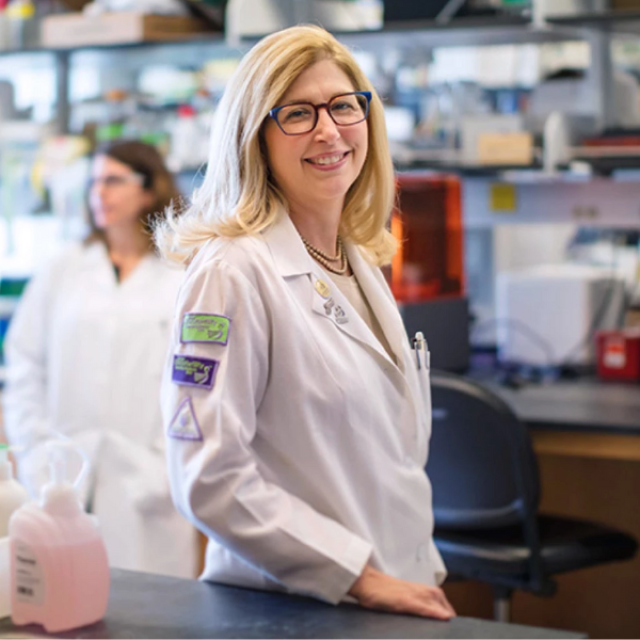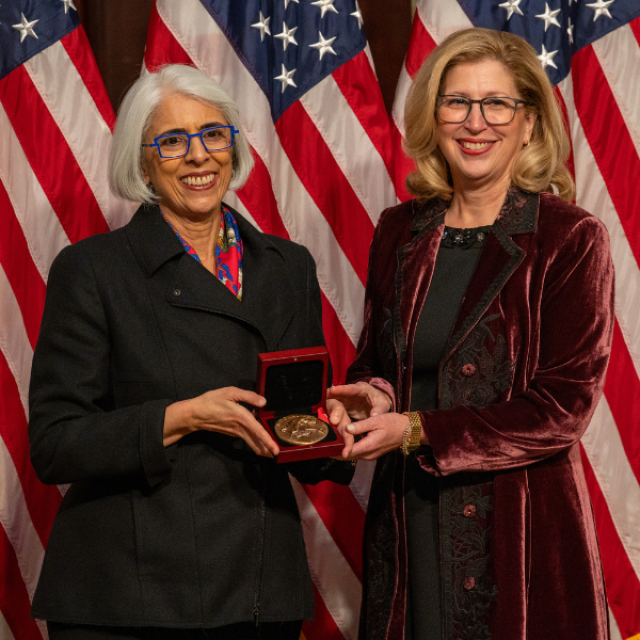Michigan State University Research Foundation Professor Teresa K. Woodruff is the 2025 recipient of the Carl G. Hartman Award from the Society for the Study of Reproduction. Woodruff, PhD, an internationally respected expert in the field of ovarian biology and reproductive science, will receive the award in Washington D.C. at the society’s annual meeting in late…
Teresa K. Woodruff joined an elite group of Americans who have received two national medals of honor when President Joe Biden announced the latest recipients of the National Medal of Science on Jan. 3.
Original Article
WBEZ asks Teresa Woodruff why so many prescription drugs were tested only on men for so many decades, what that’s meant for women’s health, and what’s changed, and much more.
Equal but biologically different. It starts in the laboratory with male cells under the microscope. Traditionally, animal studies have relied mostly on male mice or other creatures. For decades, in human clinical trials focused on diseases, drug safety and treatment effectiveness, women were often excluded or heavily outnumbered.
Northwestern University’s medical school has launched a website featuring animated characters Olivia the Ovary and Timothy the Testis to teach reproductive health to children.
Bioactive tissue paper made from organs is pliable enough to fold into origami structures
Teresa K. Woodruff is highlighted in the 2016 "Season's Grettings from Northwestern" Year in Review video for advancements in women's health.
Ramille Shah, Monica Laronda, Teresa Woodruff and Aleandra Rutz are featured for 3D printing ovaries.
Cardiovascular disease (CVD) kills 1 in 3 women worldwide, and the risk of SCD increases markedly after the cessation of ovatina function at menopause.
Her Campus provides advice, relevant information, and resources for empowered college women. The work of Dr. Woodruff is featured in one of these articles.
In this article from Northwestern Medicine News Center, Kristin Samuelson discusses the National Institutes of Health (NIH) Director Fracis Collins and Illinois Sen. Dick Durbin (D-IL)'s recent visit to Northwestern.
In this article from ChicagoInno, Karis Hustad discusses how researchers at Northwestern University Feinberg School of Medicine recently announced their use of 3D printing to create a prosthetic ovary, and successfully transplanted the organ into mice.
In this article from Daily News, Jessica Hamzelou discusses a breakthrough for cheaper, faster, drug-free IVF. "This is certainly exciting" says Teresa Woodruff at Northwestern University in Illinois. "Cumulin may be an important missing link in IVF medium used in the lab."
As a graduate of the Northwestern Graduate School, Dr. Monica Laronda is highlighted in a Spotlight story on the school's website.
Dr. Woodruff has interviewed for the article, "Sexually transmitted infections continue to strike young adults", in the Chicago Tribune discussing the importance of comprehensive sexual health education. "Many students arrive on college campuses without having taken a sex ed class since middle school," she said. And even though they may be sexually active, "having sex is…
Each year scientists across Northwestern submit images from their work which are then judged by a panel of artists, scientists and community leaders. The first place winners of 2015 included a collaborative team of Dr. Monica M. Laronda of the Woodruff Lab and Dr. Adam Jakus of the Shah Lab. The image centers on a mouse…
Dr. Woodruff served as a panelist for Northwestern Law's "Bridges not Barriers: The Law-STEM Alliance as a Catalyst for Innovation" conference. The conference explored the role of law, policy, and regulation in the innovation process; and the role of scientists, engineers, and entrepreneurs in the process of law and policy-making.
Dr. Monica M. Laronda is one of twelve investigators that received Career Awards at the Scientific Interface from the Burroughs Wellcome Fund. There were 245 eligible pre-proposal applications received for the twelfth cycle of this award program. Dr. Laronda will receive a grant of $500,000 over five years to fund her project, which focuses on “Engineering…
Lesley Stahl interviews with Teresa Woodruff and Melina R. Kibbe, MD to discuss the importance of sex and gender-based research. Topics include the importance of increasing the rate of scientific discovery, which impacts women’s health and well being.
Dr. Woodruff discusses the importance of newly-diagnosed cancer patients being informed of fertility options before undergoing treatments that could damage fertility.
The TedEx event explores how multidisciplinary teams work together to understand the complicated process of fertility and investigates questions such as:
Why is the mystery of life so complex?
Why do we need chemists, biologists, ethicists and engineers to unravel this mystery?
How do we facilitate relevant research that transcends the boundaries of established disciplines?




